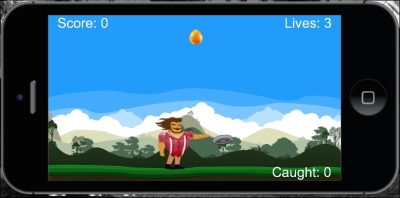Imagine a world, full of falling eggs. It's not entirely too realistic, but in this game, we're creating this element. At least, we'll be making sure that both gravity and real-world physics will be applied. To add the egg object, perform the following steps:
- Create a new local function called
eggDrop():local eggDrop = function()
- Add in the
eggdisplay object properties:local egg = display.newImageRect( "egg.png", 26, 30 ) egg.x = 240 + mRand( 120 ); egg.y = -100 egg.isHit = false physics.addBody( egg, "dynamic",{ density=eggDensity, bounce=0, friction=0.5, shape=eggShape } ) egg.isFixedRotation = true gameGroup:insert( egg ) - Add in the
postCollisionevent for theeggdisplay object:egg.postCollision = onEggCollision egg:addEventListener( "postCollision", egg ) end
We have set the egg value for x with 240 + mRand( 120 ). The mRand function is equal to math.random, which will allow the egg to appear in randomized places in an area of 120 pixels, starting at 50 in the x direction.
It is vital to make sure that egg.isHit = false for the collision event to apply correctly. The physics body is set to "dynamic" so that it reacts to gravity and makes the object fall. There is a customized density and shape made for the egg we have created, which was already made at the beginning of the code.
The last important detail for the collision to work is adding egg to the onEggCollision() function with egg.postCollision = onEggCollision and then making the event listener use the "postCollision" event with egg:addEventListener( "postCollision", egg ).